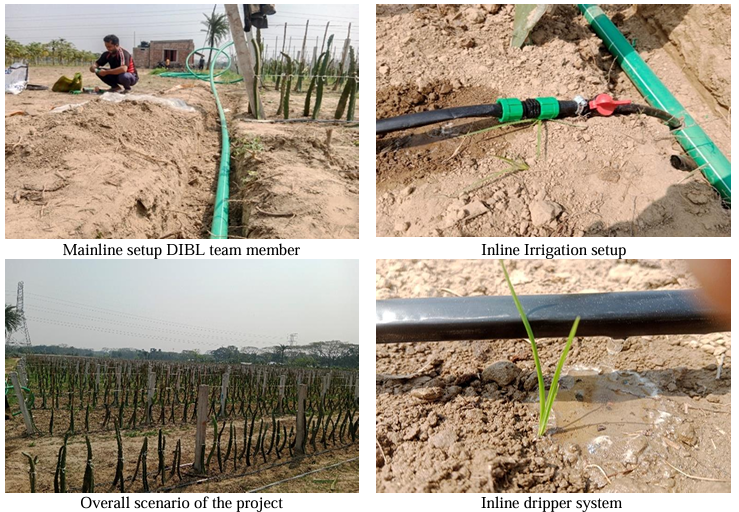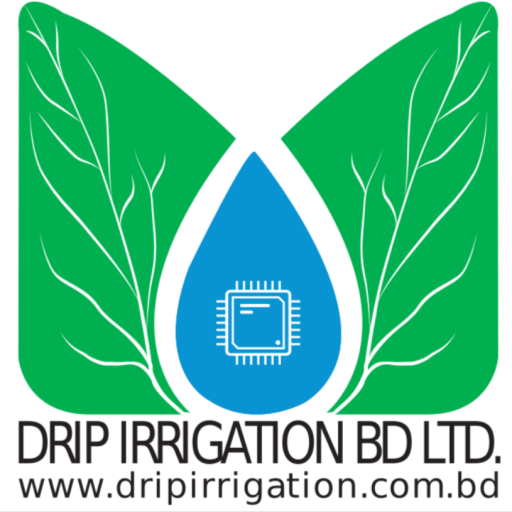Are you tired of seeing your precious crops wither under the relentless sun, despite your best efforts? Imagine a solution that not only quenches their thirst efficiently but also saves you time, money, and precious water resources. At Drip Irrigation BD Ltd. (DIBL), we’re turning this vision into reality for farmers across Bangladesh. Take a look at this recently captured project screenshot – a testament to the transformative power of our innovative irrigation solutions!

Project Spotlight: Nurturing Growth with Precision in [Specific Project Location – e.g., a Dragon Fruit Farm in Gazipur]
This image showcases the initial setup of a drip irrigation system implemented by our dedicated DIBL team member in [Specific Project Location]. This project focuses on providing a sustainable and efficient watering solution for [mention the crop being cultivated, e.g., dragon fruit]. The initiative was undertaken by DIBL in collaboration with [mention who the collaboration is with, e.g., local farmers/a private farm owner] to address the challenges of water scarcity and inefficient traditional irrigation methods prevalent in the region.
The DIBL Advantage: Smart Irrigation, Simplified Setup
The screenshot highlights the mainline and inline irrigation components of our drip system. Notice the sleek black pipes delivering water directly to the root zone of the plants. Setting up this system is surprisingly straightforward. While you can certainly handle it yourself with our comprehensive guidance, a local plumber or technician can also easily assist. And rest assured, our experienced DIBL engineers are always on hand to provide support and ensure a smooth installation process, should you encounter any difficulties.
Unlocking a World of Benefits for Farmers and Entrepreneurs:
- Water Efficiency: A Game Changer: Traditional flood irrigation often leads to significant water wastage through evaporation and runoff. Our drip irrigation systems, however, deliver water precisely where it’s needed – at the plant roots. Studies have shown that drip irrigation can reduce water usage by as much as 40-60% compared to conventional methods (Source: [Cite a relevant agricultural science journal or report]). Farmers like [mention a hypothetical farmer’s feedback] often tell us, “I used to spend hours flooding my fields, and still, some plants wouldn’t get enough water. Now, with drip irrigation, every drop counts, and my water bills have drastically reduced!”
- Boosting Crop Yields: By ensuring consistent and optimal soil moisture, drip irrigation fosters healthier and more robust plant growth. This translates directly into higher yields and better quality produce, particularly for crops like [mention relevant crops based on common drip irrigation applications in Bangladesh, e.g., vegetables, fruits like mango and lychee, and high-value crops].
- Significant Cost Savings: While the initial investment in a drip irrigation system might seem higher, the long-term savings are substantial. Reduced water consumption directly lowers water bills. Furthermore, the precise water delivery minimizes the leaching of fertilizers, leading to lower fertilizer costs.
- Embracing Automation and Smart Features: Our advanced drip irrigation systems can be integrated with timers and even IoT (Internet of Things) devices for automated and remote control. Imagine setting irrigation schedules from your smartphone, ensuring your crops receive the perfect amount of water, even when you’re not physically present!
- Sustainable Farming for a Greener Future: Drip irrigation is an environmentally friendly solution. By minimizing water runoff, it helps prevent soil erosion and reduces the risk of water pollution from agricultural chemicals. This contributes to long-term soil health and a more sustainable agricultural ecosystem.
- Winning the War Against Weeds: The localized application of water in drip irrigation significantly reduces surface soil moisture away from the immediate plant zone. This creates a less favorable environment for weed germination and growth, minimizing the need for manual weeding and costly herbicides. Farmers report a noticeable decrease in weed problems after switching to drip irrigation, leading to lower labor costs and healthier crops.
- Reclaiming Your Time and Energy: Say goodbye to the back-breaking labor of manual irrigation. Drip systems automate the watering process, freeing up valuable time and energy for farmers to focus on other crucial aspects of farm management, such as pest control, harvesting, and market access. One entrepreneur shared, “Installing drip irrigation was the best decision I made. I now have more time to expand my business and explore new opportunities.”
- Investing Wisely: Initial Cost, Long-Term Rewards: While the upfront cost of installing a drip irrigation system might be a consideration, it’s essential to view it as a long-term investment. The cumulative savings in water bills, fertilizer costs, labor expenses, and increased yields far outweigh the initial expenditure over the system’s lifespan. Consider the story of Mr. Karim from [mention a hypothetical location], who initially hesitated due to the cost but now proudly states, “Within two seasons, the increased profits from my improved mango harvest more than covered the installation cost. It was the smartest investment I’ve ever made for my farm.”
Realizing the Potential: Success Stories from the Field
We’ve witnessed firsthand the positive impact of our drip irrigation systems on farms across Bangladesh. [Insert a brief, impactful hypothetical success story here, e.g., “Farmer Halim in Rangpur saw his vegetable yield increase by 30% in just six months after implementing a DIBL drip system, allowing him to send his children to school and improve his family’s living standards.”] While specific government incentives may vary, DIBL is committed to helping farmers access any available support to adopt these efficient irrigation technologies.
Be Inspired: Opportunities Await in Sustainable Agriculture
For fellow farmers and aspiring entrepreneurs, the adoption of innovative irrigation solutions like drip irrigation presents a significant opportunity. DIBL offers comprehensive guidance and support throughout the implementation process. We encourage agribusiness startups to explore this growing sector and partner with us to bring sustainable and efficient irrigation to more farms in Bangladesh.
Project Location: [Specific District and Region of the Project]
Call to Action: Cultivate Success with DIBL!
Ready to experience the transformative benefits of drip irrigation for your farm? Contact Drip Irrigation BD Ltd. (DIBL) today for a consultation and take the first step towards a more efficient, profitable, and sustainable future!
Contact Us:
Email: [email address removed] | Website: www.dripirrigation.com.bd
Head Office:
Address: 2C/81, Parijat Apartment, North Adabor, Shyamoli, Dhaka-1207
Phone: 01324-445400 | Email: [email address removed]
Representative: Sadman Sarar (Public Relations Officer)
Branches: (Include relevant branch details as provided)
Stay Connected: (Include social media links as provided)
Drip Irrigation BD Ltd. (DIBL) | Orenge Corner Graduate | iDEA Portfolio Startup Company
© 2025 Drip Irrigation BD Ltd. (DIBL)
{ “@context”: “https://schema.org”, “@type”: “FAQPage”, “mainEntity”: [ { “@type”: “Question”, “name”: “What are the main benefits of using a drip irrigation system?”, “acceptedAnswer”: { “@type”: “Answer”, “text”: “Drip irrigation offers numerous advantages, including significantly reduced water consumption (up to 40-60%), increased crop yields due to consistent moisture, lower fertilizer costs by minimizing leaching, reduced weed growth, significant savings in time and labor, and prevention of soil erosion. Farmers also experience long-term cost savings that outweigh the initial investment.” } }, { “@type”: “Question”, “name”: “Is drip irrigation difficult to set up and maintain?”, “acceptedAnswer”: { “@type”: “Answer”, “text”: “Setting up a DIBL drip irrigation system is designed to be relatively straightforward. Our systems come with clear instructions, and many farmers can install them themselves. Alternatively, a local plumber or technician can easily assist with the installation. DIBL engineers are also available to provide remote or on-site support if any challenges arise. Maintenance typically involves periodic checks for leaks or blockages, which are easy to address.” } }, { “@type”: “Question”, “name”: “For which types of crops is drip irrigation most suitable in Bangladesh?”, “acceptedAnswer”: { “@type”: “Answer”, “text”: “Drip irrigation is highly effective for a wide range of crops commonly grown in Bangladesh, including vegetables (tomatoes, peppers, cucumbers), fruits (mangoes, lychees, papayas, dragon fruit), and high-value crops like coffee and cashew. Its precise water delivery is particularly beneficial for crops that are sensitive to overwatering or require consistent moisture levels for optimal growth and yield.” } }, { “@type”: “Question”, “name”: “How does drip irrigation help in reducing water wastage compared to traditional methods?”, “acceptedAnswer”: { “@type”: “Answer”, “text”: “Traditional flood irrigation methods often lead to significant water loss through surface runoff, deep percolation below the root zone, and evaporation from the soil surface. Drip irrigation, on the other hand, delivers water slowly and directly to the root zone of each plant through a network of pipes and emitters. This targeted application minimizes water loss due to evaporation and runoff, ensuring that the water is used efficiently by the plants.” } }, { “@type”: “Question”, “name”: “What kind of support does Drip Irrigation BD Ltd. (DIBL) offer to farmers interested in adopting drip irrigation?”, “acceptedAnswer”: { “@type”: “Answer”, “text”: “Drip Irrigation BD Ltd. (DIBL) is committed to providing comprehensive support to farmers. This includes initial consultations to assess their specific needs, customized system design, supply of high-quality drip irrigation components, installation guidance and support (both self-installation and professional assistance), ongoing technical support, and information about any available government incentives or subsidies. Our goal is to make the transition to efficient irrigation as smooth and beneficial as possible for every farmer.” } } ] }

